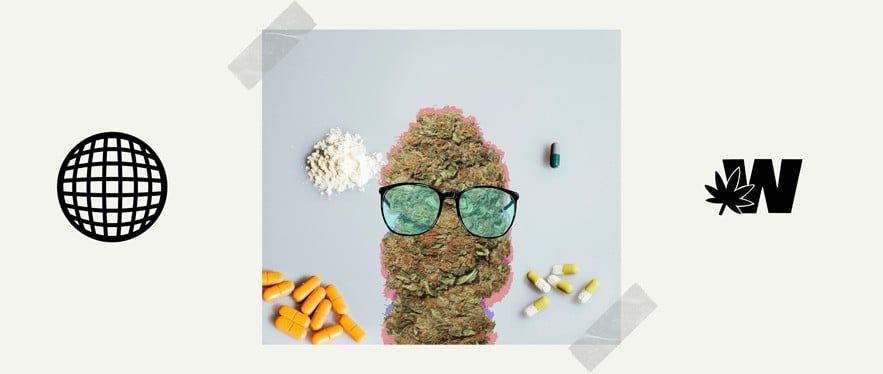
Delta-8-THC Drug Interactions
Delta-8-THC, a lesser-known cannabinoid derived from the cannabis plant, has gained significant attention in recent years due to its potential health benefits and mild psychoactive effects. However, as with any substance, understanding its interactions with other drugs and medications is of paramount importance. In this article, we will delve into the world of delta-8-THC drug interactions, shedding light on the chemical properties, legal status, and consumption methods of delta-8-THC. We will also explore the significance of knowing how delta-8-THC can interact with both prescription and over-the-counter medications, herbal supplements, dietary choices, and alcohol. By the end, you’ll have a comprehensive understanding of the potential risks and benefits associated with delta-8-THC use.
This post is intended as information and for general knowledge only. It is not a substitute for medical advice, diagnosis, or treatment. It is recommended that you talk to a healthcare professional about this before introducing cannabinoids into your daily routine (especially if you have been diagnosed with any medical conditions or are under any medication). It is not recommended to drive or operate any machinery when using cannabis- or hemp-derived products. Use responsibly!
Understanding Delta-8-THC
Delta-8-THC, short for delta 8 tetrahydrocannabinol, is a naturally occurring cannabinoid found in the cannabis plant. Its chemical structure is similar to delta-9-THC, the more well-known compound responsible for marijuana’s psychoactive effects, but it differs in the placement of a double bond in its molecular structure.
While delta-9-THC remains illegal in many places, delta-8-THC products have gained popularity due to their legal status in some regions. Delta-8-THC is typically obtained through the extraction and refinement of hemp-derived CBD (cannabidiol). It offers users the potential for relaxation, pain relief, anxiety reduction, and improved sleep, making it an attractive option for those seeking alternative therapies.
Consumers can choose from various delta-8-THC products, including vape cartridges, edibles, tinctures, and more, allowing for a personalized approach to cannabinoid intake.
The Significance of Drug Interactions
Understanding delta-8-THC drug interactions is crucial for individuals who are incorporating it into their wellness routines. Failing to consider these interactions can lead to adverse effects, reduced medication effectiveness, or unexpected consequences. To mitigate risks, it is vital for users to disclose their delta-8-THC use to their healthcare providers, ensuring safe and informed choices.
Delta-8-THC and Pharmaceuticals

Delta-8-THC may interact with various prescription medications, impacting their effectiveness or causing unwanted side effects. For individuals taking painkillers and analgesics, such as opioids or NSAIDs, delta-8-THC drug interactions may lead to enhanced pain relief, but the psychoactive effects should be closely monitored.
Antidepressants and mood stabilizers can also be affected by delta-8-THC. The interaction may alter mood regulation, potentially amplifying the effects of these medications, which can be both advantageous or problematic. Users should consult their healthcare provider for personalized guidance.
Antianxiety drugs are another category where delta-8-THC interactions may occur. Combining delta-8-THC with these medications may increase sedation and relaxation, but it can also intensify side effects like dizziness and drowsiness. It’s essential to communicate openly with a healthcare provider to assess the potential risks and benefits.
Delta-8-THC and Over-the-Counter (OTC) Medications
Even over-the-counter medications can interact with delta-8-THC. Pain relievers like ibuprofen can potentially enhance the pain-relieving properties of delta-8-THC. However, this combination may increase the risk of side effects like gastrointestinal irritation, so caution is advised.
Cough and cold remedies, often containing antihistamines and decongestants, may have synergistic or antagonistic interactions with delta-8-THC. Users should be aware of the potential for enhanced sedation or overstimulation.
Allergy medications can also interact with delta-8-THC. Some antihistamines may intensify the sedative effects of delta-8-THC, leading to increased drowsiness. It is wise to consult with a healthcare professional when using these medications alongside delta-8-THC products.
Herbal Supplements and Delta-8-THC
Herbal supplements can pose additional risks when combined with delta-8-THC. St. John’s Wort, a popular herbal remedy for mood disorders, can impact delta-8-THC metabolism, potentially altering its effects.
Valerian root, known for its calming properties, may also interact with delta-8-THC, leading to increased sedation and relaxation.
Kava, another herbal remedy, has potential liver toxicity concerns when used with delta-8-THC. Combining these substances may pose risks to liver health, making it imperative to avoid this combination.
Food and Delta-8-THC Interactions
The food you consume can influence the effects of delta-8-THC. Some foods, particularly those high in fat, can enhance the absorption and overall effectiveness of delta-8-THC. Users should be mindful of their dietary choices to ensure a consistent and controlled experience.
Alcohol and Delta-8-THC
Combining alcohol with delta-8-THC can lead to compounded impairment. Both substances can impair cognitive and motor functions, potentially increasing the risk of accidents and adverse effects. Users are strongly advised to exercise caution and moderation when considering this combination.
Managing Delta-8-THC Drug Interactions
To manage delta-8-THC drug interactions effectively, users should consult with healthcare professionals who can provide personalized advice based on their specific medications and health conditions. Self-monitoring for adverse effects and making necessary adjustments to delta-8-THC usage is essential.
Conclusion
In conclusion, delta-8-THC offers potential health benefits, but it is vital to be aware of its interactions with other drugs and substances. Responsible and informed use of delta-8-THC involves disclosing its usage to healthcare providers, seeking professional advice, and diligently monitoring for any adverse effects or altered medication effectiveness. By doing so, individuals can harness the health benefits of delta-8-THC while minimizing potential risks.
















